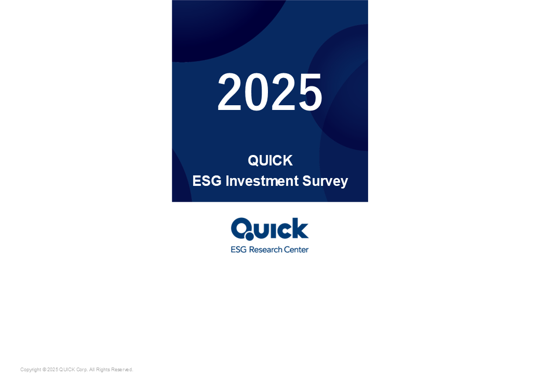Japan Markets ViewSurvey on Sustainability Awareness among Individuals in Japan
Dec 28, 2021

[Notable Points]
- Interest in the SDGs and global warming among people in their 20s is relatively low. When broken down by generation, the highest percentage of respondents in this cohort answered “did not know” when asked about the SDGs.
- Those who prioritize ESG issues over profits show concern about social issues such as human rights.
- The ESG investment recognition rate is low, at less than 20%. Information on matters such as relevance to returns is insufficient.
ESG investment involves judging the sustainability and profitability of a company’s business based on information about its environmental (E), social (S) and corporate governance (G) performance. Investment that takes ESG issues into account is currently expanding. In light of the United Nations’ Sustainable Development Goals (SDGs), QUICK ESG Research Center conducted a survey of awareness regarding ESG investment and ethical consumption, placing special focus on differences in generation. ESG investment is not currently widespread in Japan; however, it is considered that to increase investor interest, it will be essential to promote corporate disclosure and expand the amount of information that can be used when making investment decisions.
■ Generational Differences concerning the SDGs Thought to be Most Important
Participants were asked to choose 1 of the 17 SDGs Goals proposed by the United Nations that they considered most important. Every generational cohort placed Goal 3 (Good Health and Well-Being) within the top 2, and Goal 16 (Peace, Justice and Strong Institutions) within the top 4. However, regarding other issues, generational differences emerged. Goal 13 (Climate Action) was ranked in the top 3 by those over 40, while Goal 1 (No Poverty) was given a place in the top 2 by those under 40. Those in their 20s and 30s placed Goal 7 (Affordable and Clean Energy), Goal 10 (Reduced Inequalities) and Goal 11 (Sustainable Cities and Communities) at the top of the list.
■ Interest in the SDGs and Global Warming among People in Their 20s Is Relatively Low
Overall, 18.6% of respondents stated that they had never heard of the SDGs or did not know about them. Those in their 20s accounted for the highest such percentage, at 23.1%. Looking at global warming, 52.9% of all respondents believed that its effects were already occurring, with the percentage figures for those who answered in this manner increasing with age. Among those in their 20s, 37.5% believed that the effects of global warming were not yet occurring, while 35.6% said the phenomenon was already underway.
■ Low Recognition of ESG Investment and Insufficient Information on Its Relevance to Returns
Only 3.1% of respondents said that they were already investing with an eye to ESG issues. Even when including those who answered that they had heard of ESG investment, the recognition rate for this type of investing was 17.7%. However, 39.1% of all respondents said that they would like to make ESG-related investments in the future. When those expressing interest in ESG investing were asked why they felt this way, 56.2% selected “because I want to do something good for the environment and society” and “because I don’t want my money to be used for something bad” as reasons. Only 15.6% cited the fact that it would lead to returns.
Among those who were not interested in ESG investment, 37.6% said that they did not understand its relevance to returns, and 25.2% said that they would be unable to make decisions due to a lack of ESG-related information on financial products.
■ Prioritization of ESGs over Investment Returns Is Associated with Concerns about Human Rights and Other Social Issues
When broken down by sustainability issue, human rights topped the list of concerns for the “ESG investment preference group,” which prioritizes the ESGs over investment returns. By gender and generation, both men and women in their 20s showed an interest in biodiversity, whereas both men and women in their 30s and 50s gave special attention to social issues, with human rights ranking first.
For the “ESG investment consideration group,” which considers ESG factors depending on returns, environment-related issues mostly came in at the top, with water in first place, followed by forests and biodiversity. For men in their 30s and above, the top three spots on the list were taken by environment concerns, and for women in their 20s to 60s, the highest-ranked issues were all related to the environment.
■ 20% of Respondents Pay a Premium to Address Sustainability Issues
The “advanced ethical consumption group,” which pay a premium for a company’s commitment to sustainability issues, accounted for 20.4% of the respondents. By age, 23.2% of those in their 70s fell within this group – the largest such figure. They were followed by those in their 20s (22.3%), while respondents in their 50s had the lowest rate. As with the percentage figures for investment itself by age, a gentle “U-shaped” trendline can be observed here.
On average, 47.8% of the respondents in the “ethical consumption consideration group” said they would choose a company that “makes efforts if the price is the same.” These respondents noted that they would consider sustainability to a certain extent when making a purchase. Those in their 70s accounted for the highest percentage figures for such group (61.1%), with the percentages declining in tandem with decreasing respondent age. Those in their 20s (41.5%) were the most likely to have a low interest in ethical consumption (“I buy the cheapest offering, regardless of initiatives” or “I don’t think about such things”).
■ Women Who Pay a Premium for Addressing Sustainability Issues Are Interested in Biodiversity
Within the “advanced ethical consumption group” described above, women in their 50s and above consider environmental issues than men in the same age group. Overall, women showed a greater interest in biodiversity, which ranked first among those in their 20s and 30s, and second among those in their 40s, 50s and 70s.
In the “ethical consumption-consideration group” (also described above), attention to social issues was more prominent among men in their 20s to 40s, while men in their 50s to 60s focused more on environmental matters. This is the opposite of the pattern for the “advanced ethical consumption group.” Meanwhile, among women in the “ethical consumption-consideration group,” social issues topped the list for all ages.
Survey method
Nikkei Research was commissioned to conduct the survey, targeting respondents ranging in age from their 20s to 70s, divided into groups by 10-year age increments. Nikkei Research recruited registered monitors so that each age group would have 250 or more monitors (both men and women). The survey was conducted in questionnaire form, with responses being received on the Nikkei Research website. The survey was conducted from July 16 to July 20, 2021, and it had a total of 3056 respondents (33 of whom did not specify gender).
For alternative data on Japanese stocks
https://corporate.quick.co.jp/data-factory/en/product/




